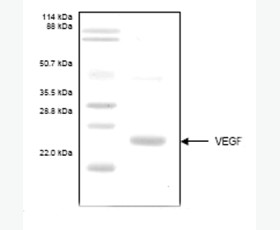Recombinant Human TNF-Like 1/TL1A/TNFSF15
| Product name: | Recombinant Human TNF-Like 1/TL1A/TNFSF15 |
| Source: | E.coli |
| Purity: | Greater than 95% as determined by reducing SDS-PAGE. |
| Buffer Formulation: | Lyophilized from a 0.2 μm filtered solution of 20mM PB, 250mM NaCl, pH 7.5. |
| Applications: | Applications:SDS-PAGE; WB; ELISA; IP. |
| Storage: | Avoid repeated freeze/thaw cycles. Store at 2-8 oC for one month. Aliquot and store at -80 oC for 12 months. |
| UOM: | 100ug/50ug/200ug/1mg/1g |
| Source | E.coli |
| Description | Recombinant Human TNF-like 1 is produced by our E.coli expression system and the target gene encoding Met1-Leu192 is expressed. |
| Names | Tumor Necrosis Factor Ligand Superfamily Member 15, TNF Ligand-Related Molecule 1, Vascular Endothelial Cell Growth Inhibitor, TNFSF15, TL1, VEGI |
| Accession # | O95150-2 |
| Formulation | Lyophilized from a 0.2 μm filtered solution of 20mM PB, 250mM NaCl, pH 7.5. |
| Shipping |
The product is shipped at ambient temperature. |
| Reconstitution |
Always centrifuge tubes before opening. Do not mix by vortex or pipetting. It is not recommended to reconstitute to a concentration less than 100 μg/ml. Dissolve the lyophilized protein in ddH2O. Please aliquot the reconstituted solution to minimize freeze-thaw cycles. |
| Storage |
Lyophilized protein should be stored at < -20°C, though stable at room temperature for 3 weeks. Reconstituted protein solution can be stored at 4-7°C for 2-7 days. Aliquots of reconstituted samples are stable at < -20°C for 3 months. |
| Biological Activity |
ED50 is less than 5 μg/ml. |
| Purity |
Greater than 95% as determined by reducing SDS-PAGE. |
| Endotoxin | Less than 0.1 ng/µg (1 IEU/µg) as determined by LAL test. |
| Amino Acid Sequence |
MQLTKGRLHFSHPLSHTKHISPFVTDAPLRADGDKPRAHLTVVRQTPTQHFKNQFPALHWEHELG LAFTKNRMNYTNKFLLIPESGDYFIYSQVTFRGMTSECSEIRQAGRPNKPDSITVVITKVTDSYP EPTQLLMGTKSVCEVGSNWFQPIYLGAMFSLQEGDKLMVNVSDISLVDYTKEDKTFFGAFLL
|
| Background | Tumor Necrosis Factor Ligand Superfamily Member 15 (TNFSF15) is a new member of the tumor necrosis factor family. TNFSF15 is predominantly an endothelial cell-specific gene, and recombinant TNFSF15 is a potent inhibitor of endothelial cell proliferation, angiogenesis and tumor growth. TNFSF15 exerts two activities on endothelial cells: early G1 arrest of G0/G1-cells responding to growth stimuli and programmed cell death of proliferating cells. These activities are highly specific to endothelial cells. TNFSF15 is also able to regulate the expression of several important genes involved in angiogenesis. These findings are consistent with the view that TNFSF15 functions as an autocrine cytokine to inhibit angiogenesis and stabilize the vasculature. |














